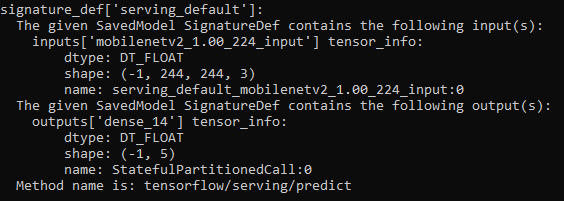Hello, I am attempting to integrate a transfer-learned model with some html code over REACT by using the tensorflow-serving docker container for a university project. I believe I have the container properly set up (was usable with the test files) but am having issues when posting to predict over JSON. Whenever I try to post to the url, I get a 404 error, even though curling the url works fine.
I believe this is an issue to do with my SavedModel, since both the test files work in my tf-serving docker container and the model.predict() function works in colab.
I have been searching over the past few days for a solution to my issue, but was unable to find any topics covering my exact issue, though I feel like I have gotten close I just cannot find what is wrong.
My model is transfer-learned from MobileNetV2, with a few added layers.
This is what the model summary shows:
Model: "sequential_1"
_________________________________________________________________
Layer (type) Output Shape Param #
=================================================================
mobilenetv2_1.00_224 (Funct (None, 1280) 2257984
ional)
dense_3 (Dense) (None, 512) 655872
dropout_2 (Dropout) (None, 512) 0
dense_4 (Dense) (None, 256) 131328
dropout_3 (Dropout) (None, 256) 0
dense_5 (Dense) (None, 5) 1285
=================================================================
Total params: 3,046,469
Trainable params: 788,485
Non-trainable params: 2,257,984
And I have it saved (from a checkpoint) by calling this code:
MODEL_DIR = '/my_model'
version = 4
export_path = os.path.join(MODEL_DIR, str(version))
tf.keras.models.save_model(
model,
export_path,
overwrite=True,
include_optimizer=True,
save_format=None,
signatures=None,
options=None
)
loaded = tf.saved_model.load(export_path)
print(list(loaded.signatures.keys())) # ["serving_default"]
infer = loaded.signatures["serving_default"]
print(infer.structured_outputs)
I have also tried to use tf.saved_model.save(), however that produced the same results.
The output from the print statements above are so:
['serving_default']
{'dense_5': TensorSpec(shape=(None, 5), dtype=tf.float32, name='dense_5')}
I have noticed that in other implementations, where ‘dense_5’ is there is normally the output name ‘prediction’.
The image attached below is the saved_model_cli information

Please forgive me if this is a simple issue, as I am quite new to Tensorflow and tf-serving, Thank you in advance.